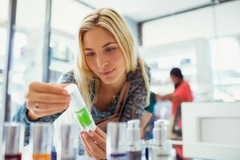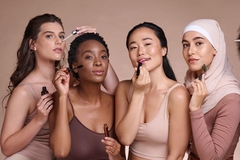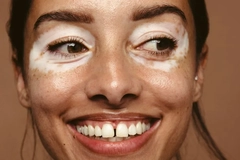January in review: AI beauty platform launches and global regulatory moves

The first month of the year saw the launch of generative AI platforms for the beauty sector, from L’Oréal’s latest tool that identifies new ingredients and formulations to a commercially available SkinGPT model from Haut.AI that helps customers predict how their skin will react to products and environmental factors.
Multiple regulatory agencies around the globe have issued opinions and updates about skin care ingredient safety, notably the EU Scientific Committee on Consumer Safety’s (SCCS) opinion regarding salicylic acid concentrations in children’s skin care products and the US Food and Drug Administration’s (FDA) proposed rule to require mandatory asbestos testing in certain cosmetics.
We spotlight new ingredients, particularly the increasingly popular skin barrier booster ectoin.

US FDA proposes mandatory asbestos testing in cosmetics with talc
A proposed FDA rule would require mandatory asbestos testing in talc-containing cosmetics products. However, federal product testing did not highlight any urgent safety issues. If finalized, the rule would standardize talc testing among personal care manufacturers and assure consumer safety under the Modernization of Cosmetics Regulation Act.
FDA’s “moral failure”: EWG calls for ban of formaldehyde in hair products
The Environmental Working Group (EWG) condemned the FDA for its continued delays in banning formaldehyde in hair-straightening products, saying the agency is putting salon workers and consumers at risk. The federal government’s most recent Unified Agenda of upcoming rules revealed that the FDA will review the proposed ban in March 2025. The FDA has missed a series of self-imposed deadlines — most recently in September — for releasing the proposal in 2024.
The Multibank, Amazon and sports fans join to fight childhood hygiene poverty
The Multibank, a charity founded by former UK Prime Minister Gordon Brown to tackle childhood hygiene poverty, increased its campaign efforts with multiple collaborations. Hygiene poverty affects 4.2 million people in the UK, according to community initiative The Hygiene Bank. Amazon launched a drive for Multibank to bring 250,000 self-care products to families who cannot afford basic hygiene necessities. The drive ran through January, and for every two purchases on Amazon.co.uk, from a selection of over 800 personal hygiene, household and baby products, a third item was donated to the network of Multibanks across the UK.
Haut.AI makes SkinGPT commercially available for beauty brands
Haut.AI launched SkinGPT commercially, transitioning from a solely B2B business model. The AI company also launched Generative.Skin: Library of Ingredient Effects, a website for users to explore how skin care ingredients impact their skin. SkinGPT uses AI to create synthetic images illustrating how skin can change over time due to environmental factors and skin care products. The technology simulates the effects of skin care products and treatments, “enabling a personalized, scientifically accurate and virtual experience.” Style & Scents Global Japanese fragrance line Maho de Sun, as seen at COSME Tokyo 2025.
Style & Scents Global Japanese fragrance line Maho de Sun, as seen at COSME Tokyo 2025.
COSME Tokyo 2025 live: International scents for the Japanese market
COSME Tokyo, Japan’s largest cosmetics trade fair, drew international beauty and fragrance companies hoping to enter a competitive Japanese personal care market with their products. Personal Care Insights spoke to two international product developers at the trade show, Style & Scents Global and Elvis+Elvin, aimed to expand their fragrance product lines in the region with distinct cross-cultural scents.
L’Oréal and IBM announce generative AI model for cosmetic formulations
L’Oréal partnered with IBM to develop a custom generative AI model that will be used to speed up cosmetic formulation processes, adding to the growing number of generative AI applications in the personal care market. IBM said that besides improving formulation discovery, the goal of the AI model is to help L’Oréal source raw materials, reduce energy, and minimize material waste. This effort could support L’Oréal’s sustainability goals if it can help the brand prioritize efficient solutions and processes.
EU SCCS issues opinion on unsafe salicylic acid concentrations for children’s products
The EU SCCS deemed salicylic acid unsafe for use as a preservative at a concentration of 0.5% in all cosmetic products for children ages three to ten. The decision was published following pushback and data from the personal care industry defending the use of the chemical in products used by children. Salicylic acid is a chemical exfoliant known for its acne-fighting properties but can also act as a preservative. Despite the data provided, SCCS found salicylic acid unsafe for children’s cosmetics in many instances. The announcement was part of the SCCS’s safety assessments on substances that may have endocrine-disrupting properties.
ECHA adds cosmetic chemical to substances of concern list
The EU Chemicals Agency (ECHA) added five hazardous chemicals to a list of substances of concern, including octamethyltrisiloxane, a chemical found in cosmetics formulations and cleaning products. Also called trisiloxane, the chemical is a silicone compound that appears as a clear, colorless liquid. It is used as a conditioning agent, emollient, and solvent in personal care products. Trisiloxane surfactants are desirable in cosmetics as they help spread ingredients swiftly and also work as a defoamer. Some cosmetics products sold in the US are still non-compliant under the US FD's cosmetics regulations.
Some cosmetics products sold in the US are still non-compliant under the US FD's cosmetics regulations.
US cosmetics companies failing on FDA compliance as industry eyes Trump nominations
Regulatory compliance firm Registrar Corp found that approximately half (48%) of the companies selling imported cosmetics at America’s top 25 retailers are non-compliant with the US FDA’s cosmetics regulations. The personal care industry is anticipating how incoming US health department appointees under the new Trump presidency might address this potential threat to consumer safety. Personal Care Insights spoke to David Lennarz, president of Registrar Corp, about how the US government should combat cosmetics that are not compliant with national safety measures.
Ectoin named the biotech active for skin protection and anti-aging
Ectoin is becoming one of the most sought after active ingredients in the personal care industry, highlighted by its increased use in product formulations. In skin care, it creates long-lasting hydration, strengthens skin barriers, and reduces inflammation, making ectoin a valuable ingredient for sensitive and aging skin products. Personal Care Insights spoke to René Schmitz technical sales and marketing manager at Bitop AG, a Germany-based biotechnology company. Bitop AG is the original manufacturer of ectoin and has expanded its manufacturing capacity in recent years to meet the increasing global demand for the ingredient.













